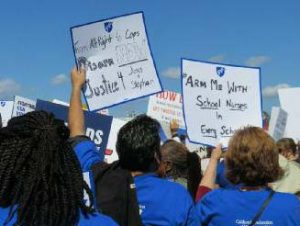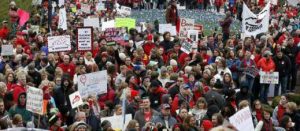Only Communist Workers’ Power Will Resolve Capitalism’s Contradictions

School workers in “March for Our Lives”
CALIFORNIA (USA) — “You’re in math and you’re a communist!” exclaimed a youngish part-time faculty union officer, eagerly taking leaflets and a copy of Red Flag. “At my school,” he continued, “all the communists teach English.”
This teacher was more open to communist ideas than most other delegates at the California Federation of Teachers (CFT) convention. However, hundreds took ICWP (International Communist Workers’ Party) leaflets and dozens took Red Flag. Hundreds more leaflets – over 500 in all – and more papers were distributed at the Orange County youth-led “March for Our Lives” that most convention delegates attended.
The convention’s main theme was the upcoming Supreme Court “Janus” decision. That ruling is expected to end the right of public-worker unions to collect “agency fees” from non-members they represent. This is part of a long-term Republican plan to weaken the union movement and, with it, the Democratic Party.
Unions are scrambling to respond. CFT leaders at this convention, as always, praised and promoted politicians they consider allies. But this year they focused, too, on organizing. They emphasized that the CFT existed for fifty years without bargaining rights or agency fees. It can again. But militant unionism is not what workers need.
Outside the “Left” and “Right” of Capitalist Politics
With the West Virginia wildcat school strike safely over, union officials are now using it as an example of the power of militant unionism. The CFT is even sponsoring a bill to make May Day a state holiday celebrating working-class struggle.
Some radicals may describe this as an example of how unions can be “moved to the left.” And they can – if “right” and “left” are correctly understood as a continuum within bourgeois democracy (a capitalist political system). That’s what it was originally: in the 1789 French assembly, royalists sat on the right and capitalist representatives on the left.
Workers need to understand politics differently: as a class struggle for power. The ICWP is not a “left” party that functions within the bosses’ system. We are a communist party that organizes to destroy that system and build an entirely new one.
The capitalist class uses its state power – including racist terror — to protect its continuing ability to profit from exploiting us. It recruits our youth to fight in its armies to defend one nation’s capitalist-imperialist bosses against their rivals.
Communist workers’ power, in contrast, will mobilize masses to end exploitation and, with it, racism, money, profits and deadly imperialist wars.
Work in Communist Society
Some think that communists who lead militant fights for reforms are showing the way to communist revolution. We disagree. Many historical examples, from all over the world, make this point. But here’s one from the recent CFT convention.
A big issue for many delegates was whether California should keep limitations on how many classes part-time faculty can teach at one college. Many argued (successfully) that the CFT should work to reduce or eliminate these restrictions. They pointed to the hardships faced by teachers who have to travel from school to school because they aren’t allowed to get enough work at any one to survive. However, others noted, this could encourage administrators to hire fewer full-time teachers, since part-timers cost less.
Other workers, like bus operators, face similar issues.
A comrade delegate said, in several conversations, that this debate showed how the wage system itself divides the working class. It creates contradictions between individual workers’ needs and those of our class.
It will be very different, the comrade said, in a communist society. Work will be organized by workers ourselves to meet everyone’s needs without money or exchange. We will work as much (or as little) as we want. Few people will do any one kind of work “full-time.” Instead, most of us will do many different kinds of work. No longer will individual needs conflict with collective needs.
Reformism and trade-unionism are dead-ends, not a road to communist revolution. But many people on those roads, like others in single-issue mass marches, are looking for something different.
That “something” is open mass mobilization for communism. We need to find more ways to build long-term ties with those who will, maybe sooner than we think, join us.

USA, April 2—Inspired by the recent West Virginia school strike, teachers walked out in Kentucky (above) and Oklahoma.

